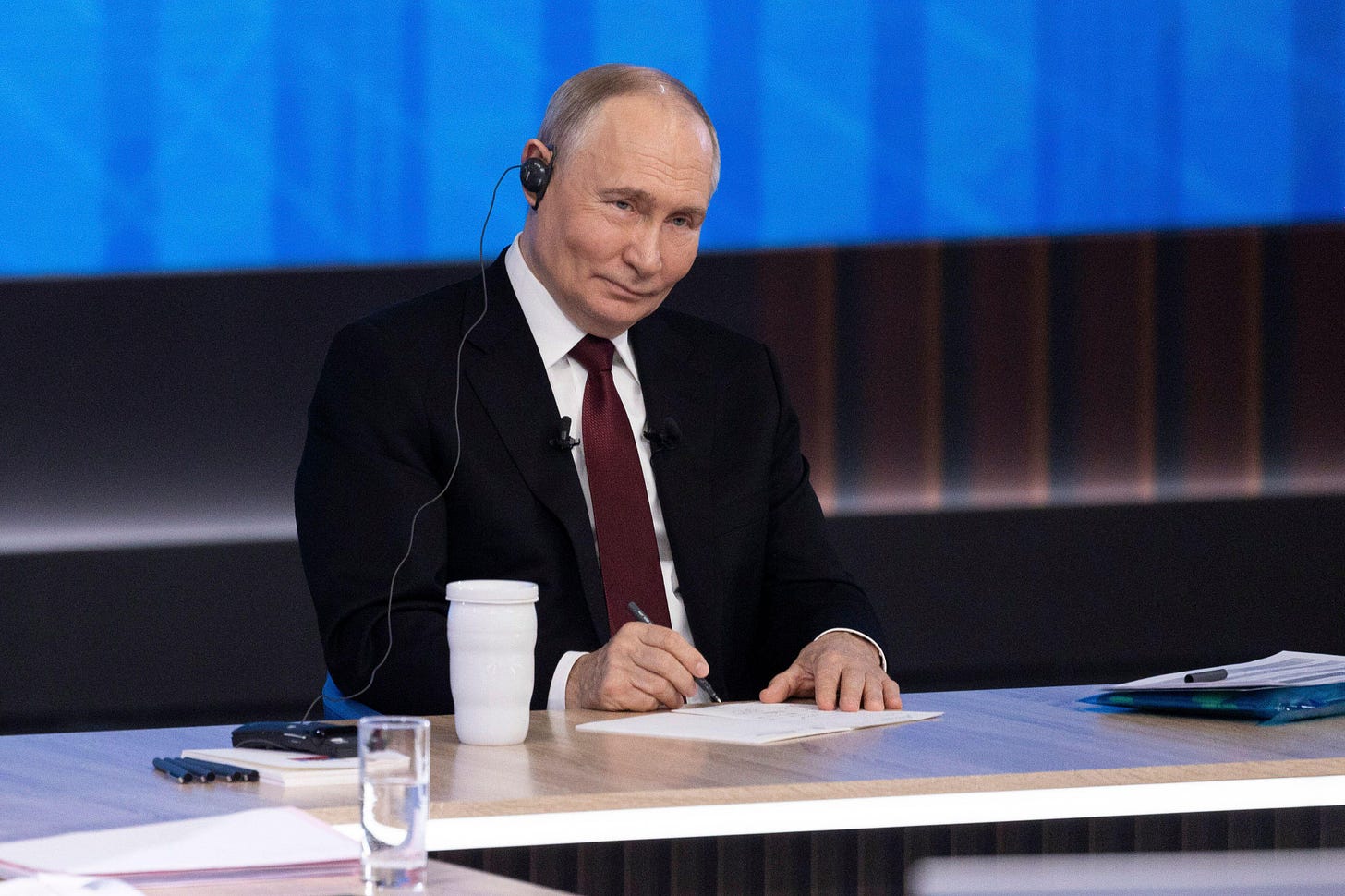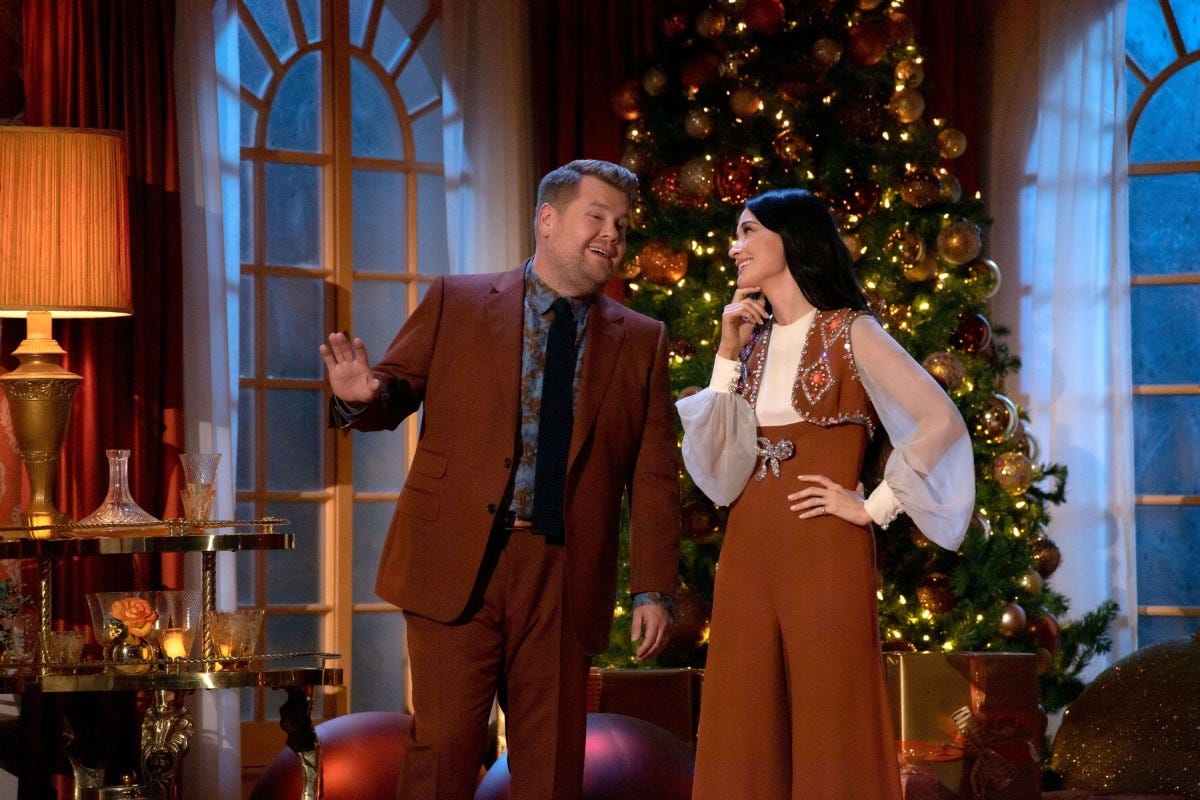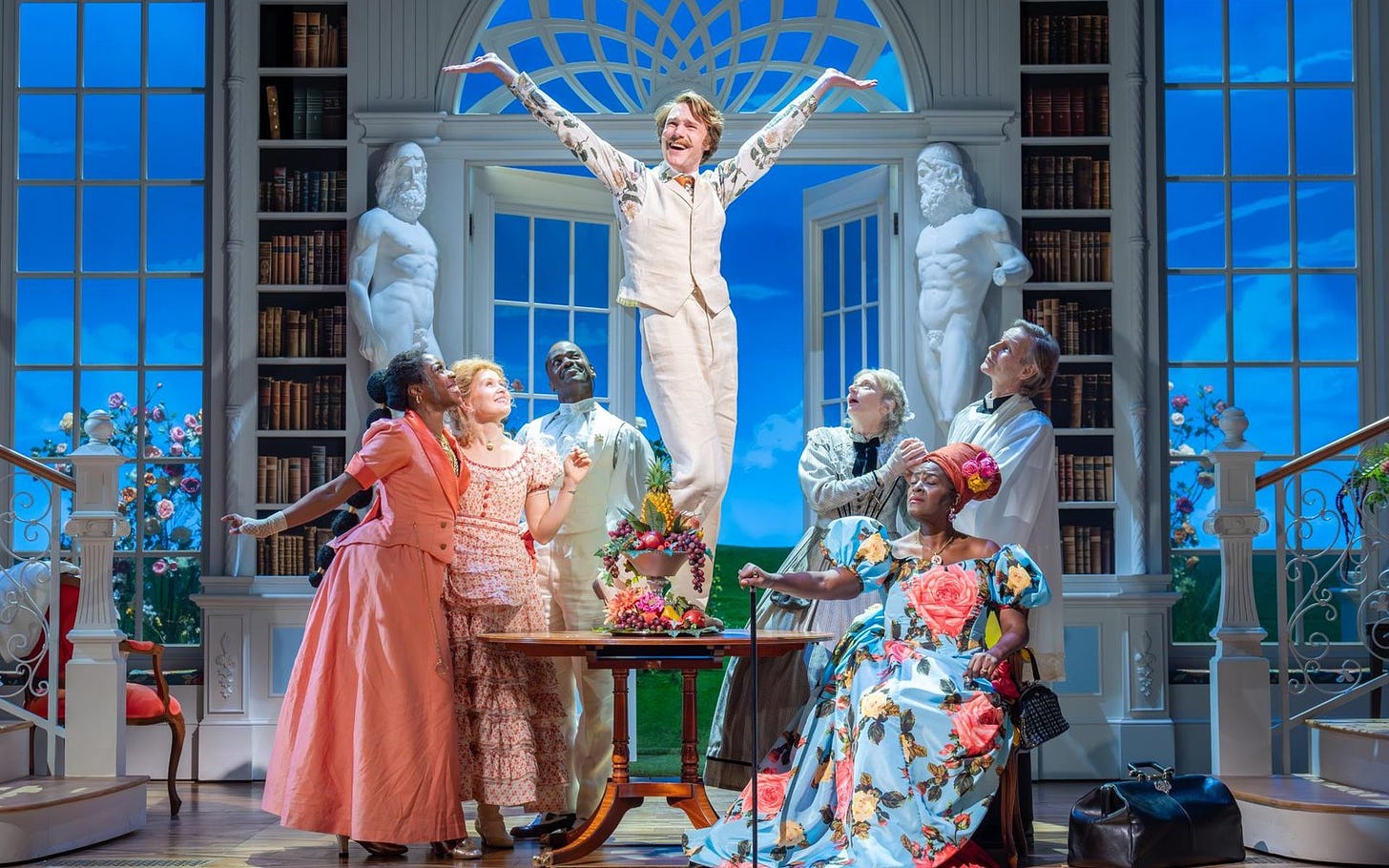Is the end to the Russia-Ukraine war in sight?
The Trump-effect seems to already be changing the tunes of both sides.

In a revealing Q&A marathon today, Vladimir Putin declared he is “ready” for peace negotiations involving both Trump and Zelensky, as Russia is “near to achieving its primary goals in Ukraine”.
Putin tempered with the caveat that only a “long-lasting peace deal” will be acceptable and that Zelensky must be re-elected as President before talks begin, as the Ukrainians’ current mandate – extended by an emergency wartime provision – has expired. Seemingly obtuse, Putin has long maintained that Zelensky is an "illegitimate leader" unfit to negotiate with. Yet the implicit suggestion today that a re-elected Zelensky would then be legitimate signals an intriguing concession from the Russian side.
The Russian leader was hardly gunning for the Nobel Peace Prize however, as he threatened further escalation and raised the prospect of a missile dual with the West, contending that Russia’s Oreshnik missiles could outdo the West’s finest countermeasures to devastate Kyiv. Despite the sabre rattling, the overarching theme from Putin today was diplomatic, and marked the clearest signal from the Russian leader to date that he wants to stop this turning into a forever war.
Zelensky appears to be edging towards a diplomatic conclusion as well, as he has moved away from a maximalist position in recent weeks. Speaking to Le Parisien earlier this week, Zelensky conceded that Ukraine lacks the ability to retake Crimea and the Donbas militarily, suggesting diplomatic “pressure from the international community” was the only hope to regain the seized territories.
His military pessimism – perhaps pragmatism – follows a series of earlier comments in which he indicated that the war’s end could come in 2025 and that occupied territory could be left uncontested upon NATO membership. While offering alternatives to further military conflict, Zelensky is far from waving the white flag and he has vowed to reject demilitarisation and the “freezing of the front-lines” proposal floated by Trump allies.
Even so, Zelensky’s shifting priorities and Putin’s apparent openness for negotiation indicate that the Trump effect is taking hold.
When Trump was pressed last week as to whether he would “abandon Ukraine”, he reframed the question to focus on the “staggering numbers of dead young soldiers lying on fields all over the place”. He continued: “It's really an advantage to both sides to get this thing done. It's crazy what's taking place.”
How exactly Trump plans to strike this deal of the century remains opaque. But it seems the President-elect is aiming to offer the carrot and the stick to each side before he enters the Oval Office.
Just after his election victory last month, reports emerged that Trump extended an immediate olive branch to Putin via a phone call – something Biden has not done in years – but cautioned him not to escalate the conflict in Ukraine before the year’s end.
Zelensky has faced a similar ambiguity from Trump. The two exchanged warm greetings in Paris earlier this month, but Trump has loudly denounced Biden’s long-range missile permissions for Ukraine. And his chosen peace envoy, Keith Kellogg, criticised the SBU’s daring Moscow assassination as “not a smart thing to do”.
Trump has said that he will “possibly” reduce aid to Ukraine once in office, a possibility that has greatly unnerved the Ukrainian side, with analysts warning that the gap left by Washington would be too great for Europe to fill on its own.
Trump aside, both sides have other growing incentives to bring the war to a close in the coming months. For Putin, the Russian ruble is facing a precipitous decline as it continues to deteriorate even after the Russian central bank's decision last month to intervene. On the home front, uncertainty lingers as Russian territory in Kursk remains occupied and Ukrainian drones continue to deal devastating blows to the nation’s oil industry.
In Ukraine’s case, constant bombings, losses in the East, and attacks on the power grid have ground down the nation’s morale. Accompanying these losses comes Trump’s claim that 400,000 Ukrainian casualties have been incurred, a far cry from Zelensky’s seemingly improbable 43,000 fatalities figure.
As Trump's return to the Oval Office nears and the consequences of prolonged war weigh heavily on each side, it appears peace may finally be within reach. But at what cost for Kyiv? That remains unclear.
Josh Schlicht
Reaction Reporter
ON REACTION TODAY
David Waywell
’Tis’n’t the season to be jolly
Emily Gray
The Importance of Being Earnest: Wilde's classic has aged beautifully
ALSO KNOW
Lord Mandelson appointed US ambassador - Keir Starmer has appointed former Labour cabinet minister Lord Mandelson as British ambassador to in Washington, according to a report in The Times this evening. He will take up the post as Donald Trump becomes President. Mandelson last served in government fourteen years ago under Gordon Brown.
Interest rates held - The Bank of England has voted to hold interest rates at 4.75 per cent. This comes after yesterday's figures from the ONS showed that inflation rose by 0.3% from October to November. There is also expected to be no growth in the last three months of 2024, despite the Bank having forecast a 0.3% increase. Rates will be reassessed in the new year, with a cut expected as early as January to help grow the economy.
Gisèle Pelicot's ex-husband jailed - Dominique Pelicot has been found guilty in a mass rape trial, the largest ever in France. He drugged his ex-wife, Gisèle, raped her and invited strangers over to abuse her for nearly a decade. The 72-year-old was sentenced to 20 years, while 50 other men were found guilty of at least one charge.
Rise in average water bills expected - The average water bill in England will rise by 36 per cent over the next five years, the regulator Ofwat said today. Households will pay an average of £86 more next year, from April. This is part of a bill increase to invest in supply upgrades and reduce sewage discharges, with the water industry having received criticism over such issues.
Starmer faces senior MPs - Britain's Prime Minister was scrutinised by MPs on the Liaison Committee today for the first time since Labour was elected in July. This included questions on the economy, of which Starmer said it “will take some time” for peoples’ living standards to improve. He was pressed on a range of issues such as immigration policy, education, and foreign policy on Ukraine, Gaza and Syria. The Prime Minister is expected to attend the committee three times a year. He also insisted he had no regrets so far into his premiership and that the government is focused on delivering, first and foremost.
FIVE THINGS
Curated by the Reaction Team - William Martin
Trump plus Biden = one good Syria policy. Steven A. Cook in Foreign Policy
Only decisive leadership will transform Whitehall – this isn’t it. Eliot Wilson in CapX
Russia’s Cold War Redux strategy for the Middle East lies in ruins. Ibrahim Al-Marashi in Engelsberg Ideas
How liberal America came to its senses. Jonathan Chait in The Atlantic
We are paying way too much for our cuppa, in Country Squire Magazine






